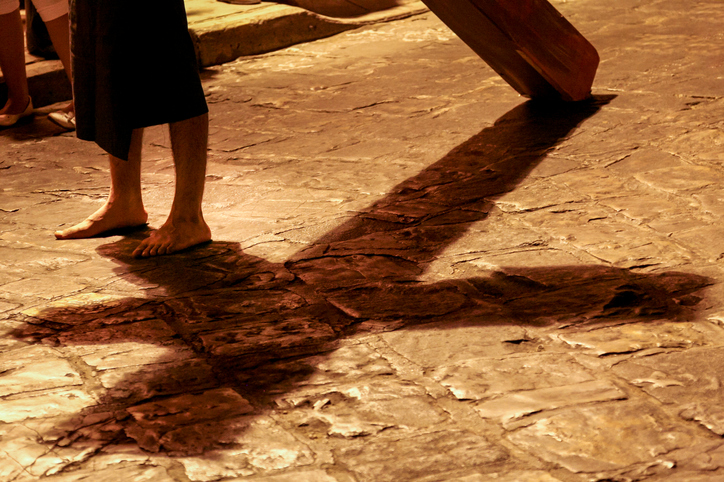The parable of the prodigal son is one of Jesus’ better known even in the culture at large. The drama of the ungrateful son callously calling for his inheritance, squandering it, and humbling himself to return to his father resonates with each of us in some way. Who hasn’t arrogantly been sure they didn’t need the authority God has set over them, and gone off to try their own way?
These days, though, it seems the focus of homilies on this parable doesn’t dwell on the blatant sins of the younger son so much as the arrogance and anger of the older. Perhaps we’ve become so complacent about the excesses of modern life that we no longer name as sins, so we focus on our contempt for our ‘brothers’ and our outrage that the father will forgive those heinous sins, never thinking of the enormity of our own disconnect from God’s will.
I think we miss the point. If we ‘fall short of the glory of God’, we’re still short, whether by a mile or a millimeter. Both brothers disrespect their father, and need his love and mercy. And he is ready to take each of them in to give them what they need, not because of their worthiness, but because of his love. In his Lenten Letter of, 2014 Bishop Arthur Serratelli, Diocese of Paterson, NJ writes:
“When we tarnish our dignity as children of God by our sins, the father is ready to clothe us again in his grace through the Sacrament of Reconciliation. However, just as the prodigal son, we need to confess our sins. We are body and spirit. We live by word and deed. We have the need to be seen and to be heard. We need to say our sins out loud to the priest and to hear the words of forgiveness spoken by him in the name of Jesus.”
As St. Athanasius teaches, “Just as a man is enlightened by the Holy Spirit when he is baptized by a priest, so he who confesses his sins with a repentant heart obtains their remission from the priest.”
It is not so much that God cannot forgive us without confession to a priest. Rather, he has given us this great sacrament precisely to meet us in our humanity. Whether we sin like the younger brother, grievously separating ourselves from God, or like the elder brother, separating ourselves from others, frequent confession opens us up to the love of God and helps us to appreciate that we are members of the family of God and not isolated individuals.
The same love that the father shows the younger son, he extends to the elder brother. To his selfish insistence on his own rights, the father tenderly gives a gentle reprimand. He invites him to be seated at table, celebrating the joy of being one family. He waits for his response. He waits for ours.
Taking our place at the Lord’s Table! Being part of the family of God! This is where our observance of Lent leads us. During the forty days of Lent, we deepen our prayer, practice fasting, and increase our works of charity (cf. Matt 6:1-18) to prepare for Easter. On that solemn Feast of feasts, we gather, with the newly baptized, to join with Jesus in his Passion, Death, and Resurrection. Through the Paschal Mystery, Jesus makes real in our lives the Parable of the Prodigal Son.
Jesus goes to the Cross, taking upon himself our sins. He is the son who knows the infinite mercy of the father who says, “This son of mine was dead, and has come to life again; he was lost, and has been found” (Lk 15:24). His road to Golgotha is the way to glory. And so Jesus “humbled himself, becoming obedient to death, even death on a cross. Because of this, God greatly exalted him and bestowed on him the name that is above every name” (Phil 2:8-9).
The Cross of Jesus is the return of the Prodigal Son, all of us, into the home of our father. For, in the arms of the Crucified Christ, we encounter the father who runs to meet us. He embraces us with his love, even as we try to utter our words of repentance. His love overwhelms us. He invites us to the Eucharist. Seated at our rightful place at the table of the Lord, we already share in the eternal banquet of the Lamb, slain, and raised from the dead, where one day, we will know a joy that never ends.
May our journey through the purification and enlightenment of this Lent bring us to the loving arms of the father who “removes guilt and pardons sin… Who does not persist in anger forever, but delights rather in clemency.”

Pamela joined Diocesan’s staff in 2006, after a number of years in the non-profit sector. Her experience is in non-profit administration including management, finance, and program development, along with database management and communications. She was a catechist in her parish RCIA program for over 15 years, as well as chairperson of their Liturgy Commision. Received into the Catholic Church as an adult, Pamela’s faith formation was influenced by her Mennonite extended family, her Baptist childhood, and her years as a Reformed Presbyterian (think Scott Hahn).




















